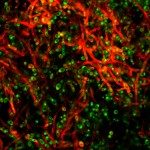After obtaining her Master degree in Genetics at the Paris Diderot University (European Magistere of Genetics) in 2013, Adeline Feri has started her PhD training under the supervision of Mélanie Legrand in the Fungal Biology and Pathogenicity Unit headed by Christophe d’Enfert. She is investigating genome stability and more precisely loss-of-heterozygosity (LOH) events in the human fungal pathogen Candida albicans. Using the I-SceI meganuclease, Adeline has developed a system allowing the induction of DNA double-strand breaks at a unique site in the C. albicans genome. In parallel, she also constructed a collection of overexpression plasmids carrying genes involved in DNA processes and signalling pathways. She has conducted a screen to identify genes whose overexpression results either in an increase of the basal LOH rate in a wild-type condition or in a diminution of the high LOH frequency induced by stress exposure (H2O2, high temperature, antifungals) or I-SceI expression. This work aims to identify and characterize new signalling pathways controling genome dynamics in this species.
Cliquez pour voir le graph
Connexions
Cliquez pour voir la ligne de temps
Ligne de temps
Anciennes Équipes
CV
Publications
Télécharger-
2021Factors that influence bidirectional long-tract homozygosis due to double-strand break repair in Candida albicans., Genetics 2021 Mar; (): .
-
2019Candida albicans: An Emerging Yeast Model to Study Eukaryotic Genome Plasticity, Trends Genet. 2019 Apr;35(4):292-307.
-
2019Identification of Recessive Lethal Alleles in the Diploid Genome of a Candida albicans Laboratory Strain Unveils a Potential Role of Repetitive Sequences in Buffering Their Deleterious Impact, mSphere 2019 02;4(1).
-
2016Analysis of Repair Mechanisms following an Induced Double-Strand Break Uncovers Recessive Deleterious Alleles in the Candida albicans Diploid Genome, mBio 2016 10;7(5).
-
2015A FACS-optimized screen identifies regulators of genome stability in Candida albicans, Eukaryotic Cell 2015 Mar;14(3):311-22.
-
2013A study of the DNA damage checkpoint in Candida albicans: uncoupling of the functions of Rad53 in DNA repair, cell cycle regulation and genotoxic stress-induced polarized growth, Mol. Microbiol. 2014 Feb;91(3):452-71.


